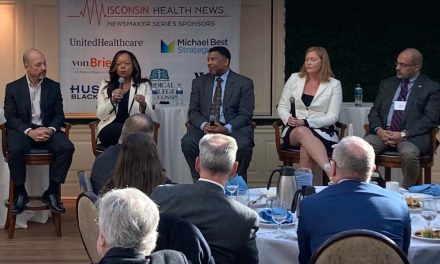
UW research aims to help older Americans make better decisions about high-risk surgery
MADISON—A UW-Madison research team is about to launch a national study to improve how older adults make decisions about high-risk surgical treatments.
Supported by a $2.1 million award from the Patient-Centered Outcomes Research Institute (PCORI), the study will address issues that affect more than a half million older Americans every year: facing high-risk surgery, many of these patients report being “blindsided” by how their health is after surgery, and a small group will have serious complications that require treatment that may not be consistent with their personal values and preferences.
“Unfortunately, the way that surgeons and patients currently communicate often makes decision-making challenging,” says Dr. Gretchen Schwarze, associate professor of surgery at UW School of Medicine and Public Health and principal investigator of the study. “We aim to close the gap between what surgeons know and what patients understand by empowering patients and family members to ask the right questions about how high-risk surgery may ultimately affect them in both the short and long term.”
One proven way to do this is to provide patients with a question list, or QPL, that patients and their loved ones can review before meeting with a doctor to discuss the possibility of surgery. Schwarze and her team have collaborated with former patients and family members who’ve already experienced high-risk surgery to adapt existing questions into a QPL that they hope will better meet the needs of older people considering their surgical options.
During the study, Schwarze and her colleagues will work with patient and family advisors and other health-care stakeholders to compare their QPL with the standard of care. The study will enroll 480 patients (240 in the intervention arm and 240 in the usual-care arm), from five US cities: San Francisco, Boston, Newark, Portland, OR and Madison, WI. Participants will be patients 65 and older who have other health problems and who are considering a high-risk vascular or cancer surgery.
Researchers will collect data from patient interviews and surveys administered before and after surgery and then determine if QPL intervention increases patient participation in decision- making, increases patient and family well-being, reduces post-treatment regret, and decreases post-treatment conflict.
“This project was selected for PCORI funding not only for its scientific merit and commitment to engaging patients and other stakeholders, but also for its potential to fill an important gap in our health knowledge and give people information to help them weigh the effectiveness of their care options,” said PCORI Executive Director Dr. Joe Selby. “We look forward to following the study’s progress and working with the research team at the University of Wisconsin School of Medicine and Public Health to share its results.”
The award has been approved pending completion of a business and programmatic review by PCORI staff and issuance of a formal award contract.
PCORI is an independent, nonprofit organization authorized by Congress in 2010 to fund research that will provide patients, their caregivers and clinicians with the evidence-based information needed to make better-informed healthcare decisions.





